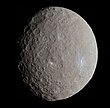2014 FC69
Appearance
Parts of this article (those related to observation arc) need to be updated. (June 2020) |
| Discovery [1][2] | |
|---|---|
| Discovered by | |
| Discovery site | Cerro Tololo Obs. |
| Discovery date | 25 March 2014 |
| Designations | |
| 2014 FC69 | |
| Orbital characteristics [1] | |
| Epoch 28 June 2014 (JD 2456836.5) | |
| Uncertainty parameter 8 | |
| Observation arc | 302 days |
| Aphelion | 103.83 AU |
| Perihelion | 40.434 AU |
| 72.135 AU | |
| Eccentricity | 0.4395 |
| 612.67 yr (223,777 days) | |
| 88.017° | |
| 0° 0m 5.76s / day | |
| Inclination | 30.126° |
| 250.10° | |
| 189.19° | |
| Physical characteristics | |
| Dimensions | 533 km[4] |
| 4.6[1] | |
2014 FC69 is a trans-Neptunian object orbiting in the scattered disc, approximately 533 kilometers in diameter. It was first observed on 25 March 2014, by astronomers at the Cerro Tololo Inter-American Observatory in Chile. Because of its great distance and short observation arc of 302 days, the object's orbit is too poorly determined to know whether it is in an orbital resonance with Neptune.
Distance
Based on the best-fit (albeit uncertain) orbital solution, 2014 FC69 last came to perihelion around 1869,[1] and is currently (as of February 2016[update]) about 84.2 AU from the Sun. Other than long-period comets, it is the fifth-most-distant known large body in the Solar System (see table below).[5]
See also
References
- ^ a b c d e "JPL Small-Body Database Browser: (2014 FC69)" (2015-01-21 last obs.). Jet Propulsion Laboratory. Retrieved 2 August 2017.
- ^ "2014 FC69". Minor Planet Center. Retrieved 2 August 2017.
- ^ "MPEC 2015-C52 : 2014 FC69". IAU Minor Planet Center. 11 February 2015. Retrieved 12 November 2015.
- ^ a b "List of Known Trans-Neptunian Objects". Johnston's Archive. 22 July 2017. Retrieved 2 August 2017.
- ^ "2014FC69". Asteroids—Dynamic Site.
External links
- 2014 FC69 at AstDyS-2, Asteroids—Dynamic Site
- 2014 FC69 at the JPL Small-Body Database


